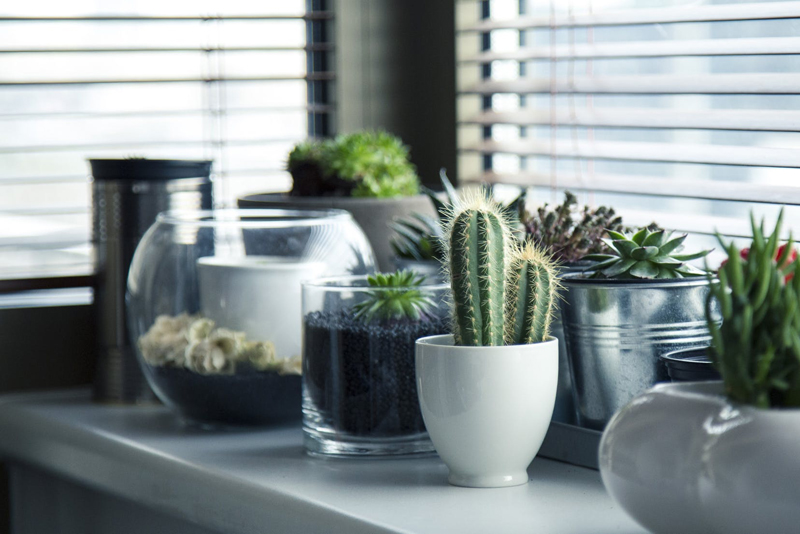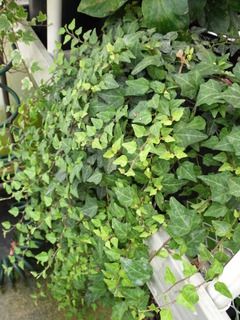English Ivy

English Ivy (Hedera helix) is one of the easiest-to-grow foliage plants and makes a wonderful houseplant. Outdoors, in many areas, English Ivy is considered a noxious weed because it is such a vigorous grower. It’s no danger to native species when kept indoors in a pot so put its full potential to good use above your kitchen cabinets, framing a window or cascading from a hanging basket.
 One of the nice things about English Ivy is that it prefers indirect lighting. It can be grown in just about any room with a window. Use this plant to accent places in your home that aren’t suitable for more sun-loving varieties. There are many types of English Ivy to choose from with different variegation and leaf shapes and different types can be planted together for greater interest.
One of the nice things about English Ivy is that it prefers indirect lighting. It can be grown in just about any room with a window. Use this plant to accent places in your home that aren’t suitable for more sun-loving varieties. There are many types of English Ivy to choose from with different variegation and leaf shapes and different types can be planted together for greater interest.
English Ivy is a good choice for forgetful-waterers. It prefers to be watered thoroughly every couple of days, drying out in between, but will tolerate dryer conditions than most houseplants. When the plant is at its limit the leaves will take on a grayish cast; those leaves will begin to get crispy and will easily break off the plant. While this isn’t something you want have happen to your plant, it is okay because the plant can always be cut back and fresh growth will emerge.
I recommend fertilizing English Ivy at every other watering when it is actively growing, and not at all when it is resting. If you see it regularly putting out new leaves, continue fertilizing. If it seems to be “stuck” and not growing, keep watering to a minimum and don't fertilize at all. Keep an eye out for any white, crusty materials that may accumulate, as they indicate that the plant is getting more than enough fertilizer. If this happens, flush the pot out repeatedly with clear water and cut back on how often you fertilize.
English Ivy needs to be pinched back every so often to give it fullness and a nice shape; this is a great opportunity to start another plant. It is very easy to propagate English Ivy. Cuttings can be taken at any time, but preferably when the plant is actively growing. Root cuttings in a lightweight medium with or without rooting hormone. Covering the rooting cuttings with a sheet of plastic wrap until roots have developed will increase success.
There is research indicating that English Ivy is an excellent natural air filter. Studies have shown that it effectively removes airborne mold spores and pet waste particles from the air. It is also ranked in the top 10 air-cleaning plants by NASA because it is so efficient at removing harmful chemicals, such as benzene, from the air.

English Ivy is a good choice for forgetful-waterers. It prefers to be watered thoroughly every couple of days, drying out in between, but will tolerate dryer conditions than most houseplants. When the plant is at its limit the leaves will take on a grayish cast; those leaves will begin to get crispy and will easily break off the plant. While this isn’t something you want have happen to your plant, it is okay because the plant can always be cut back and fresh growth will emerge.
I recommend fertilizing English Ivy at every other watering when it is actively growing, and not at all when it is resting. If you see it regularly putting out new leaves, continue fertilizing. If it seems to be “stuck” and not growing, keep watering to a minimum and don't fertilize at all. Keep an eye out for any white, crusty materials that may accumulate, as they indicate that the plant is getting more than enough fertilizer. If this happens, flush the pot out repeatedly with clear water and cut back on how often you fertilize.
English Ivy needs to be pinched back every so often to give it fullness and a nice shape; this is a great opportunity to start another plant. It is very easy to propagate English Ivy. Cuttings can be taken at any time, but preferably when the plant is actively growing. Root cuttings in a lightweight medium with or without rooting hormone. Covering the rooting cuttings with a sheet of plastic wrap until roots have developed will increase success.
There is research indicating that English Ivy is an excellent natural air filter. Studies have shown that it effectively removes airborne mold spores and pet waste particles from the air. It is also ranked in the top 10 air-cleaning plants by NASA because it is so efficient at removing harmful chemicals, such as benzene, from the air.
This site needs an editor - click to learn more!
You Should Also Read:
Spider Plant
Ficus Elastica, the Rubber Tree
Houseplants Newsletter 
Related Articles
Editor's Picks Articles
Top Ten Articles
Previous Features
Site Map
Content copyright © 2023 by Lisa Beth Voldeck. All rights reserved.
This content was written by Lisa Beth Voldeck. If you wish to use this content in any manner, you need written permission. Contact
BellaOnline Administration
for details.


